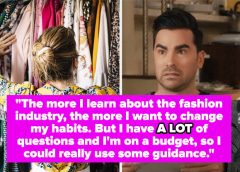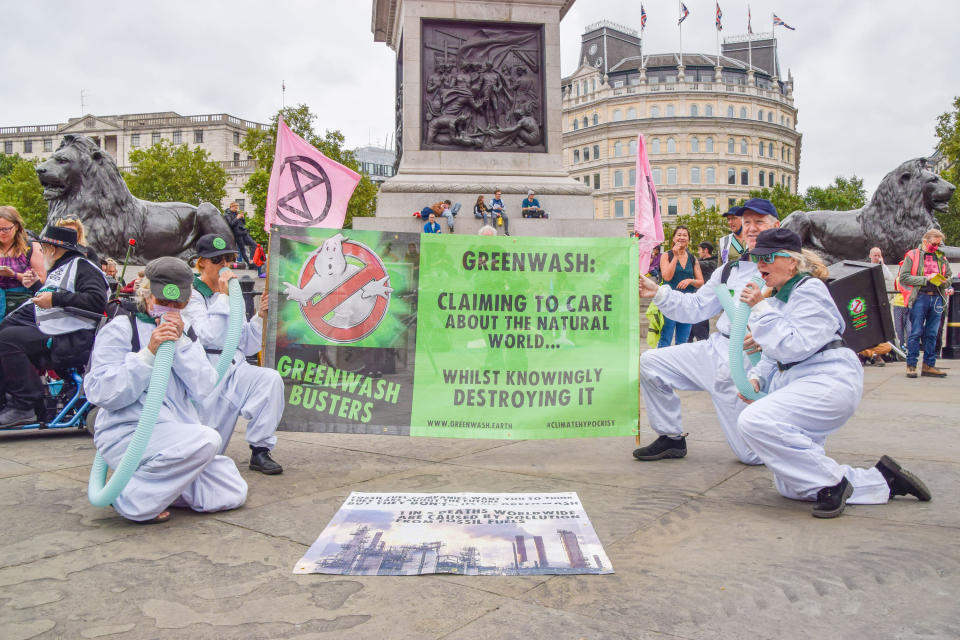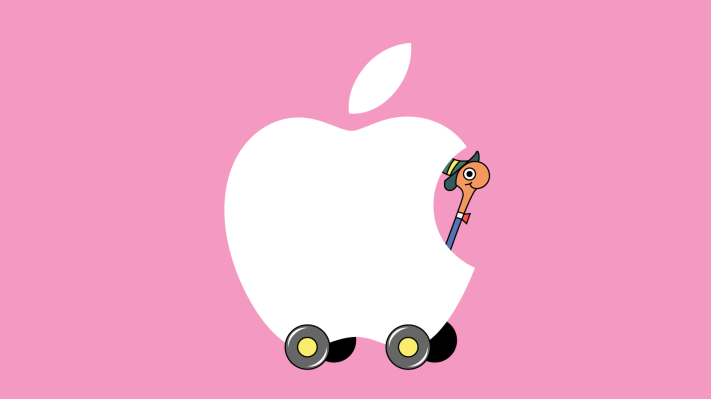
Is This Fashion Brand Really Sustainable Or Just Expensive, And More Ethical Shopping Questions Answered
[ad_1]
Lately I’ve been hearing a lot about problems with the fashion industry — especially fast fashion. For starters, did you know that the fashion industry is responsible for 8%–10% of global carbon emissions and almost 20% of wastewater? And that’s just scratching the surface.

It’s recently been reported that some clothing from the fast-fashion brand Shein contains unhealthy levels of lead, and many garment workers around the world labor in dangerous conditions for less than a living wage.
Liudmila Chernetska / Getty Images/iStockphoto
The more I learn about how the fashion industry operates, the more I want to change my habits. But I have A LOT of questions and I’m on a budget, so I could really use some guidance.
CBC / Via giphy.com
I also understand that it’s a privilege to be able to say “no more” to fast fashion. For many people, these brands are often the most accessible or affordable option.
My intention is never to shame other consumers; instead, we should all be focused on holding brands accountable and demanding that they do better.
To find answers to my questions about becoming a more ethical consumer of fashion, I interviewed Katrina Caspelich, Director of Marketing at Remake, a 501(c)3 nonprofit fighting for climate justice and fair pay in the clothing industry.
Before we get into the whole nitty gritty, it’s helpful to define a couple of terms. First up, what exactly is sustainable fashion?

Katrina says that sustainable fashion is pretty much what it sounds like. “Sustainable fashion usually means eco-friendly practices in the fashion industry, referencing the approach of designing, producing, and consuming clothes that respect the planet by causing little to no damage, and therefore sustaining the environment.”
And she says that recycling, reusing, and upcycling old clothes are other great sustainable practices that we can engage with no matter where we shop.
Firn / Getty Images/iStockphoto
And how do you define ethical fashion?
CBS / Via giphy.com
Ethical fashion is a little bit harder to define because it can mean different things to different people. “Many fashion brands simply define ethical production as adhering to local labor laws,” Katrina explains. “At Remake we know that this is not good enough because our clothes are often made in places where labor laws are weak and enforcement is even weaker.”
She says that it’s important to look at the whole picture, and not simply take brands at their word when they say they’re ethical. “Instead of asking, ‘Is this product doing no harm to the people who made it,’ we reframe the question to ask, ‘Is this product leaving the people who make it better off?’ Ethical for us means brands committed to treating their makers with fairness, respect, and care.”
Additionally, she also considers sustainability when she’s determining if a brand is ethical. “For us, brands cannot be truly sustainable unless they’re also ethical, and vice versa. After all, what good is organic cotton if it’s harvested with slave labor? And what good is the living wage payment of a garment worker if her body is threatened by toxins being output during the sourcing and production processes?”
Recently, brands like H&M have been accused of greenwashing. What does greenwashing mean?

Katrina says greenwashing is when brands market their products in a way that makes them appear very eco-friendly when in reality they are anything but. “It is common for fashion companies to use sustainability to differentiate themselves in the marketplace and appeal to socially conscious customers (like us!) without actually being committed.”
Sopa Images / SOPA Images/LightRocket via Getty Images
Sooo let’s say you come across a fashion brand that gives off a “sustainable and ethical” vibe. How can you tell if they’re legit or just greenwashing?
TLC / Via giphy.com
Katrina recommends doing a deep dive on their website to see if they can back up their green image with actual facts. She suggests asking questions like, “Is the brand using language that is hard to understand? Does it avoid using detailed language around the topic of sustainability? Is the brand using language in a way that markets itself as being environmentally and socially concerned without offering detailed stats and information to back it up?”
And she says you can also tell a lot by analyzing their marketing and social media presence. “Is the brand using generic nature shots or stock images to depict their sustainability, or are they using imagery of their actual sourcing and manufacturing practices? Are they showing you images of the men and women making their products on their website?”
Bottom line: If a company’s commitment to ethical fashion and sustainability seems kind of vague, they’re probably greenwashing you. Legit ethical brands will typically have hard facts about where their products are sourced and made on their website.
A lot of more ethical fashion brands unfortunately cost too much to be really accessible to a lot of people. What are some more affordable ways we can change our fashion habits?

Katrina suggests a number of ways that we can lessen our fashion impact, like shopping second-hand at thrift stores and online using sites like thredUP and Poshmark (which I personally love because I can filter for items in my size).
She also advocates for clothing swaps, renting clothes, and rediscovering items we haven’t worn in a while. “The most sustainable wardrobe is the one we already own,” she says.
Another way we can make a difference is by simply buying less, and wearing what we do purchase for longer. “It’s no secret that a lot of used clothes end up in landfills. That’s regrettable, but you can do something about it. Remember, the longer we can keep clothing in use, the more we keep out of landfills.”
And if you really wanna step things up, she’s even got a challenge for you. “Take the #NoNewClothes pledge and refrain from purchasing new apparel for a full three months. The act of pledging to buy no new clothes will help you reset your relationship with fashion and assess your consumption habits.”
Netrun78 / Getty Images/iStockphoto
On the other hand, we might assume that all brands with a higher price tag are giving us better products that are more ethically made. But are they really?
Amazon MiniTV / Via giphy.com
Katrina says absolutely not. “Designer clothing has moved downmarket to keep up with fast fashion, and increasingly the materials are not higher quality and, if mixed with polyester, bad for the planet. Moreover, just because something costs more does not mean the women within the supply chain are paid more.”
One big red flag in her book is the lack of transparency that designer brands have around their sustainability and labor practices. “Designer brands are notoriously opaque in their supply chains, even more so than some high street brands. So they aren’t paying people better nor reducing their carbon impact.”
What advice do you have for people who want to start building a more ethical wardrobe?

So, first of all, Katrina advises folks looking to shift to a more ethical wardrobe to go slow — and don’t get rid of all your old fast-fashion pieces. You already have them, so getting the most out of those items is the sustainable thing to do.
Here are a few more tips from Katrina:
“• Asking yourself if you’d wear something 30 times before you buy it. If not, it’s best to walk away.
• Taking stock of what you own. The best way to practice sustainability is by shopping your closet before purchasing anything new.
• Checking out vintage, rental, or consignment options before purchasing anything new. One of my favorite things to do is ‘shop’ my sister’s closet (with permission, of course).
• Taking care of your clothes. Loved clothing lasts, so try to wash them on cold, line dry, skip the dry cleaner, and mend.
• Investing in quality not quantity.“
Westend61 / Getty Images/Westend61
And finally, are there ways we can make a difference outside of changing our shopping habits?
HBO / Via giphy.com
Katrina says it’s important to hold brands accountable, which we can do by raising awareness and by simply not giving them our hard-earned cash. “Part of promoting change within the fashion industry means holding brands accountable — even if they are your longtime favorites. Many well-known brands that consumers know and love are violating human rights on a daily basis.
For example, Levi’s has refused to sign onto the International Accorda life-saving agreement that prioritizes the safety of garment workers within the brands’ supply chains. Hard to fathom, right? Still, it’s vital that we vote with our dollars and let these brands know we won’t support them until they start acting ethically.”
What are your thoughts on sustainable fashion? Sound off in the comments!
[ad_2]
Source link


